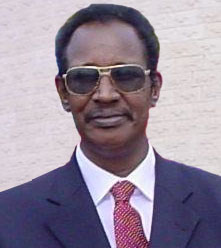fiogf49gjkf0d

Dr. Mohamed A. Omar
Wednesday, April 30, 2008
 |
|
President Dahir Riyale Kahin
May 15 could be defining moment for Somaliland´s House of Representatives |
As Dahir Rayaale hangs on to power beyond his presidential term and delays elections, Somaliland sleepwalks into a political crisis. This puts the country´s democratic process and its international standing at risk – the two most crucial goals that are indispensable for Somaliland´s political future.
Although the president ´s term of office ends on 15 May, the country´s Upper Chamber, unelected body known to be close to the President, has unilaterally extended his tenure by one year recently, thereby ignoring the election plans agreed by all political parties and the National Election Commission (NEC). It is widely believed that Rayaale was behind this move, in a bid to extend his time in office.
In Somaliland, the move has caused widespread political furore. The opposition parties, the elected Lower Chamber of the Parliament, civil society and members of the public have expressed their objections to this unconstitutional step.
From the international community, the reaction was loud and clear too. The European Union, a key partner in Somaliland´s democratisation programme, articulated their concerns on the decision and called on all political groups in Somaliland to stick with the original election plans agreed by all stakeholders.
The government´s initial response to the public challenge was militaristic. The capital city of Hargeisa was put on curfew and armed military men are now patrolling the main streets. On 26 April, Hana Hassan Jama, was shot dead in Hargeisa by patrolling soldiers, and became the first victim of Rayaale´s stop-and–search orders. She was an innocent young girl who poses no threat to the national security.
To the outside world, the government´s reaction was equally shocking. In an astonishing statement, the Foreign Minister, Mr. Abdillaahi Du´ale, accused the European Union of interfering in Somaliland´s affairs, and told the EU that his government does not need their financial and technical support to Somaliland´s democratisation programme.
This statement is damaging to Somaliland´s international position and can negatively affect the search for recognition. One could actually argue that the Minister and the President, who has supported his Minister´s statement in a speech at the Parliament, have both shamelessly failed to serve Somaliland´s national and long-term interest in favour of their personal short-term political aims.
This comes from a government, which is supposedly promoting the democratisation process and the country´s relations with the international community - the two most important strategic objectives of Somaliland.
There are some possible explanations for the government´s behaviour. One explanation may be that Rayaale is trying to repeat what his predecessor, Mohamed Ibrahim Egal, did in 1994, when the Guurti, (the current Upper Chamber) controversially extended his term of office. Egal then found himself embroiled in a range of conflicts with opposition forces, which lasted until October 1996.
It is also possible that Rayaale and his associates might have accepted the notions of multi-party democracy on paper only, and having won the 2003 election by a dubious small margin, are not ready to risk losing power, particularly, in the context of increasingly popular and incredibly powerful and united opposition, ready and eager to take over power. Rayaale seems to be feeling the heat already
Another explanation could be that Rayaale is modelling ideas he borrowed from his peers in the region. Ethiopian Miles Zinawe has been in power since 1991, killing and detaining opposition figures during the 2005 parliamentary election. The Ethiopian Parliament still has empty seats, as detained MP did not take their seats.
In Eritrea, Isaias Afworki has nothing better to offer. He was elected as president by a transitional legislation in 1993, and he cancelled indefinitely the parliamentary election that was planned to take place in December 2001. The Eritrean constitution was ratified in May 1997 but has not yet been put into effect.
In Somalia, Abdillahi Yusuf, whose term of office will finish soon, does not appear to be preparing his country for the scheduled multi-party elections in the next year.
Yet, unlike Rayaale, Zenawi, Afworki and other leaders in Africa such as Mugabe offer historical narratives to justify their attempts to stay in power. Their desire to rule originates from their status as leaders of national liberation movements. They have liberated their countries either from colonial powers or oppressive regimes. Therefore, they perceive themselves as the heirs of their people´s freedom and feel connected with the grassroots through this history.
Interestingly, the above examples make Somaliland an odd one. In Somaliland, there is situation now in which the leader of the country´s popular liberation movement, Ahmed Siilaanyo, is an opposition leader, and all that he is asking for is a fair and timely election. This is in contrast to the mainstream political reality in Africa, which Somaliland should be proud of.
Somalilanders are not alone in taking their democracy serious. Most notable, president Olusegun Obasanjo of Nigeria was forced out when his term finished. In Kenya, people have attempted similar approaches. And, increasingly, other African nationals are demanding for their voices to be heard.
With the public fiercely opposing the controversial power extension, there is bound to be a political crisis in Somaliland after15 of May, the day the presidential term officially runs out. Forming a transitional administration, that would lead the nation to an election, is the most urgent political question Somaliland has to address. The Lower Chamber, the only democratically elected body in the country after the 15 of May, must fill in the vacuum and help the country get through these worrisome days. It needs to provide an interim leadership, uphold the rule of law, offer a level playing field for the competing political parties, and above all, avoid conflict. This could be a defining moment for Somaliland´s House of Representatives.
Mohamed A Omar(BA, MA, PhD), academic, writer and political analyst with special interest in African politics, post-conflict state reconstruction and international relations.